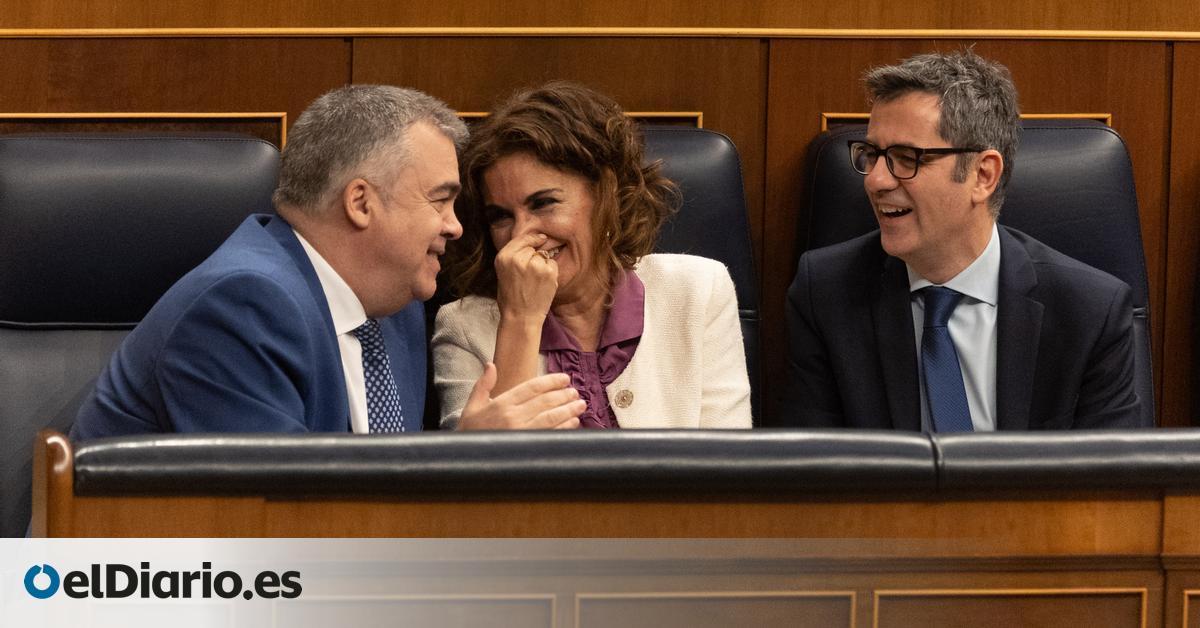
Junts has voted against the amnesty law in the Plenary Session of Congress. Their seven votes, along with those of PP, Vox, Canarian Coalition and UPN, stop short the parliamentary processing of the norm on which the stability of Pedro Sánchez’s Government must pivot. It is January 30 and the face of the president sitting in his seat on the blue bench of the Chamber says it all. After many months of negotiations at the limit, risk-taking and political exhaustion in trying to push forward the law, the PSOE receives this setback like a real slam of the door from Carles Puigdemont that leaves the legislature in a stalemate.
Sánchez, with a gesture of circumstance, crosses the hallway and avoids the questions from the press. Before leaving Congress he has a brief conversation with his closest team. His anger is obvious. He is not willing to endure any more humiliation after weeks in which the Catalan independence movement has shown off the influence of its seven deputies to twist the arm of the Government in parliamentary votes taken to the limit.
The president’s order is that the negotiations stop dead for a few days and that the communication channels established between the socialists and the independentists since the night of July 23 also remain frozen. At Moncloa they are convinced that they have gone as far as they could in these negotiations. And also of having been generous enough to receive another response and another treatment from their interlocutors.
Santos Cerdán, the organizational secretary of the PSOE and main negotiator with Junts, conveys this deep discomfort by telephone to his usual interlocutor, Jordi Turull, the general secretary of the independentistas. He tells him that his group’s position greatly complicates things for the future, that neither the President of the Government nor anyone in his party understands his refusal, that they have rigorously complied with everything agreed upon and that his vote against does nothing else. to reinforce the movements of the most conservative judiciary aimed at overturning the amnesty.
This conversation of crossed reproaches gives way to six long days of absolute silence between Santos Cerdán and Jordi Turull, something very unusual since the leader of the PNV, Andoni Ortuzar, introduced them in a restaurant in Bilbao just one year ago, in March 2023. With no electoral advancement of the general elections in sight and without any relevance of Puigdemont’s party in the parliamentary arithmetic that supports the first coalition government, Pedro Sánchez proposes opening a means of contact with that sector of the independence movement so relevant in Catalonia and with which there have been no bridges in the last decade.
With Ortúzar as host, Cerdán and Turull connect quickly. Men of the utmost confidence of Sánchez and Puigdemont, both establish a political relationship with regular conversations. The organizational secretary of the PSOE goes to Barcelona several times during those months to meet with the leader of Junts. They talk about the situation in Catalonia, how things are going in Congress, and the three years and eight months that Turull spent in prison. And the political relationship becomes personal.
Therefore, when the left crashes in the municipal and regional elections on May 28 and Pedro Sánchez advances the general elections and then the polls make Junts essential for the governability of the country, the channels of dialogue between the PSOE and those of Puigdemont work already at full capacity. On the same night of July 23, Cerdán and Turull talk with the results in hand. And they confirm the willingness of both parties to explore an understanding that allows Pedro Sánchez to continue in Moncloa. Although no one at that point had yet put the key word on the table, the president’s team already knew on good authority that everything was going through the amnesty.
Santos Cerdán then begins a journey through several European countries to meet personally with the Junts management at the highest level, including Carles Puigdemont. And he has clear instructions from Moncloa about the limits of the playing field in which this very delicate political game can be played out: neither referendum nor self-determination. Outside of that, the PSOE is willing to talk about everything. Puigdemont’s response is that he accepts the rules of the game to make Sánchez’s investiture possible in exchange for a general amnesty for all those involved in the independence process.
The socialists had received messages and calls from Puigdemont’s entourage that they had decided not to answer.
After the six days of incommunication between Cerdán and Turull due to the parliamentary processing of that amnesty, the PSOE is moving again. The socialists had received messages and calls from Puigdemont’s entourage that they had decided not to answer. Aware that within the independence movement itself, voices of suspicion were beginning to rise towards an attitude of Junts that could jeopardize a unique opportunity to shelve the judicial situation of hundreds of those prosecuted by the process, those of Pedro Sánchez once again put the spotlight on two other red lines on the table: neither the crime of terrorism nor that of treason can disappear from the exceptions to the pardon measure.
The Junts team of lawyers considers that the wording of the rule may leave out many people. A conviction to which the latest movements of the Spanish justice system contribute regarding the Democratic Tsunami case, based on which the judge of the National Court, Manuel García Castellón, and the Supreme Court appreciate indications of a crime of terrorism by Carles Puigdemont . And the same in the case of the crime of treason by the well-known “Russian branch” of the process.
In the PSOE there is no doubt that all the complexities that the amnesty negotiation has faced have been crossed by a kind of action-reaction game. A chess game between the maneuvers of Justice and the positions of Junts.
The legal teams of both parties worked hard in a marathon of conversations to find a solution that did not arrive. Puigdemont personally conveyed to the PSOE leadership that he was willing to take the risk of being left out of the amnesty if he was the only one, but that he would never support a version of the norm that, according to his calculations, could leave him without the benefit of the amnesty. measure of grace to between 200 and 300 defendants.
An appointment in Barcelona
The days go by and, faced with the absolute blockade, the PSOE promotes the extension of the Justice Commission, which must reissue the opinion of the law proposal once it has been rejected by the Plenary. Junts shows great interest in the technical teams stopping the negotiations for a few days to make way for a meeting at the political level that can help unlock the block. The PSOE accepts and the meeting takes place in Barcelona.
Joining the direct dialogue between Turull and Cerdán at that meeting in Barcelona were Míriam Nogueras, the pro-independence parliamentary spokesperson, and Félix Bolaños, another of the President of the Government’s most trusted men, in charge of the negotiations with ERC, and the person who He has the final say on the technical content of the law as Minister of Justice. But the appointment, as all parties agree, is going very badly.
The countdown in Congress for the unblocking of the norm brings out nerves in the PSOE. There are those among the socialists who are beginning to criticize: that until now they had been “very soft” in the negotiations with Junts and that they had to tighten up. And they defend, in fact, resuming the processing of the law with the text as it is because Puigdemont’s people “cannot vote no.”
From the negotiating team of the Socialists, where they know their interlocutors better than anyone, however, the warning is raised: with Junts the details will not be valid and, if they want to have their seven votes, it will be necessary to introduce modifications in the text no matter how limited they may be.
Several times in person outside of Spain and almost daily by videoconference – a format in which Jordi Turull even participates from the hospital where he is recovering from a heart attack – Cerdán and the team of PSOE negotiators intensify contacts to seal a political agreement on which jurists, a posteriori, can specify a legislative solution. Even José Luis Rodríguez Zapatero gets involved in that political part, who contacts all the actors involved to try to influence everything to end well.
According to all the parties involved, the definitive exit from the labyrinth is, surprisingly, indicated by the PP
Two weeks ago the political agreement was finally closed. The PSOE and Junts formally commit that there will be an amnesty law and the frameworks in which modifications can be introduced are delimited. All that remains is to finish off a text with surgical corrections in the terms used to satisfy all parties. In this situation, there are those who even propose resorting to a dictionary of synonyms in search of the words that generate greater consensus.
As all parties involved agree, the definitive exit from the labyrinth is, surprisingly, indicated by the PP. Because with the report of the Venice Commission to which those from Feijóo appealed to try to derail the amnesty law, Junts and ERC see the sky open.
The pro-independence supporters consider that the advisory body of the Council of Europe comes to overthrow all the arguments put forward by the political and judicial right. “This report ensures that there are no problems of separation of powers and that judges, therefore, are obliged to apply the law in favor of its effective application,” say Junts sources, who also see the opinion in the opinion as the perfect opportunity to reference the exclusions for terrorism or betrayal of community and international law to the detriment of the Spanish Penal Code, in his opinion more open to the interpretation of judges regarding these types of crimes.
With everything on track, at the end of the negotiation a final short circuit arises. The discrepancies between Junts and ERC, without any dialogue between them for a long time, are negotiated through socialist intermediaries, with Félix Bolaños and Santos Cerdán becoming mere messengers of the demands of both pro-independence formations at that point in the conversations. .
The PSOE then proposes a daring solution: that Junts and ERC try to talk directly to each other, to see what happens. And that, when they reach a meeting point, they transfer it to the Socialist Party. Fresh from the hospital, Jordi Turull calls the general secretary of ERC, Marta Rovira, who remains in Geneva. According to both parties, they reached an agreement very quickly thanks, in large part, to the aforementioned report on the amnesty prepared by the Venice Commission at the request of the Popular Party.
“The day the PP asked the Venice Commission for its opinion, God came to see us and we didn’t know it,” ironically says one of the most important people in Pedro Sánchez’s Government. On Thursday, the Justice Commission definitively unblocked the proposed amnesty law that will be endorsed, this time, by the Plenary on March 14 to clear the dark clouds that were hanging over the legislature. And the next stop, the General State Budgets, is getting closer.
Source: www.eldiario.es

